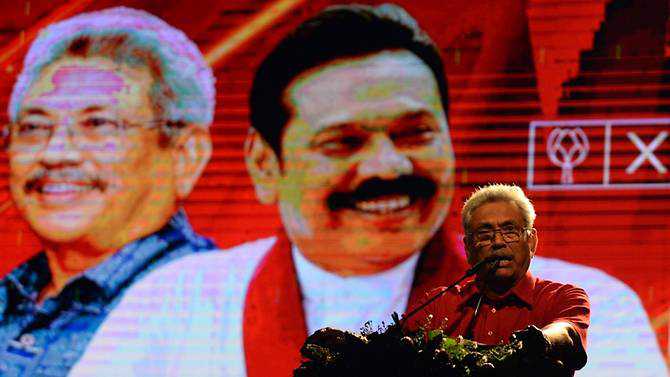Rajapaksas eye comeback in Sri Lanka presidential election
16 November, 2019

Sri Lankans choose a new president on Saturday (Nov 16) in what could mark a comeback for the Rajapaksa clan, lauded by supporters for crushing the Tamil Tigers but condemned by critics for war crimes, corruption and cosying up to China.
Four years after political bruiser Mahinda Rajapaksa lost power, his brother Gotabaya, 70, is running for the top job, promising development and security in the wake of Islamist extremist attacks that killed 269 people in April.
His main opponent is Sajith Premadasa, 52, from the governing liberal United National Party (UNP), son of assassinated former president Ranasinghe Premadasa, who is also pushing security and development as well as free sanitary pads for poor women.
Polls are due to open at 7am local time and results could be known as early as midday Sunday.
The Rajapaksas are adored by Sri Lanka's Sinhalese majority for defeating the Tigers and ending a 37-year civil war on the Indian Ocean island in 2009 in which around 100,000 people lost their lives.
For the same reason the brothers are detested and feared by many in the Tamil minority, who make up 15 per cent of the population, not least due to the way the conflict ended with some 40,000 Tamil civilians allegedly killed by the army.
During Mahinda Rajapaksa's presidency from 2005-15, Gotabaya was defence secretary and effectively ran the security forces, even allegedly overseeing "death squads" that used white vans to abduct, torture and in some cases kill political rivals, journalists and others.
The grey-haired retired army lieutenant colonel, dubbed the "Terminator" by his own family, denies the allegations.
"If Mr. Gotabaya Rajapaksa returns, the white van culture will return," Alfonso, a half-Tamil man living in Colombo, told AFP. "Nobody can speak against him. Nobody, not just us."
Police and electoral officials collect ballot papers ahead of Saturday's polls. (Photo: AFP/Jewel SAMAD)
Many Muslims in the Buddhist-majority country of 21.6 million are also worried, having already witnessed increased antipathy since the April attacks including hundreds of homes and shops being trashed in the immediate aftermath.
After the civil war ended in 2009, Gotabaya "presided over the opening up of a new area of conflict, which was the Sinhalese majority versus the Muslims," analyst Paikiasothy Saravanamuttu told AFP.
"We had a number of incidents of violence against the Muslim community and Gotabaya was seen to be very much as a sponsor and supporter, particularly of an organisation called Bodu Bala Sena (Buddhist Power Force)."
CHINESE SUBS
What also concerns Western countries, as well as India, is that strategically located Sri Lanka moved closer to China under Mahinda, even allowing two Chinese submarines to dock in Colombo in 2014.
Beijing loaned and granted Sri Lanka billions of dollars for infrastructure projects under China's immense Belt and Road Initiative spanning Asia and beyond. Mahinda says credit was unavailable elsewhere.
Sri Lanka was forced in 2017 to hand Beijing a 99-year lease on the port of Hambantota after being unable to service a US$1.4-billion Chinese loan, highlighting for critics the debt dangers of the Belt and Road scheme.
An airport in the south has failed to retain a single international airline. Another white elephant is Colombo's unfinished "Lotus Tower", believed to be South Asia's tallest free-standing communications tower.
"Chinese entities were also credibly accused of fuelling corruption, illegally funnelling money to favoured political candidates, and inserting sovereignty-violating provisions into their infrastructure agreements," said Jeff Smith, a research fellow at US think-tank the Heritage Foundation.
He added though that Gotabaya may have "learned some lessons from his brother's tenure; that he recognises the downside risks of backsliding on democracy and human rights, and of excessive dependency on China."
Western capitals "should give a fair chance to us," Basil Rajapaksa, another brother, told reporters.
"They can't be monitors of this country. They must be partners."
Source:
